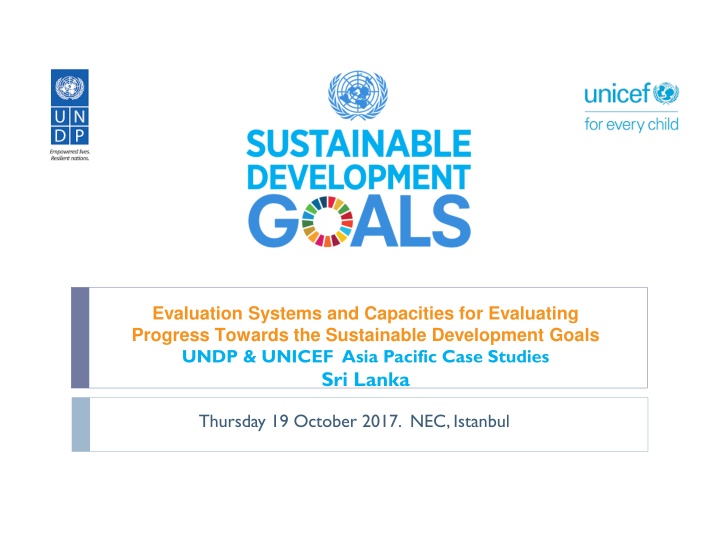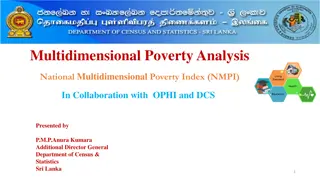Progress Towards Sustainable Development Goals in Sri Lanka
National evaluation systems and capacities for evaluating progress towards the Sustainable Development Goals in Sri Lanka. Learn about key findings, strengths, and emerging policies focusing on achieving the SDGs by aligning with the national Vision 2025 framework.
Download Presentation

Please find below an Image/Link to download the presentation.
The content on the website is provided AS IS for your information and personal use only. It may not be sold, licensed, or shared on other websites without obtaining consent from the author.If you encounter any issues during the download, it is possible that the publisher has removed the file from their server.
You are allowed to download the files provided on this website for personal or commercial use, subject to the condition that they are used lawfully. All files are the property of their respective owners.
The content on the website is provided AS IS for your information and personal use only. It may not be sold, licensed, or shared on other websites without obtaining consent from the author.
E N D
Presentation Transcript
Evaluation Systems and Capacities for Evaluating Progress Towards the Sustainable Development Goals UNDP & UNICEF Asia Pacific Case Studies Sri Lanka Thursday 19 October 2017. NEC, Istanbul
Sri Lanka Case Study : Country Context - National Evaluation Systems Policy : Department of Project Management & Monitoring (DPMM) under new Ministry of Development Assignments leading development of a National Evaluation Policy since 2016. Sustainable Development Council Bill also passed by Parliament showing the high level political commitment Based on the Government policy framework Vision 2025: A Country Enriched which aligned to SDG 2030 Agenda the Public Investment Programme has also prepared by the Department of National Planning prioritizing some localized indicators. System National Monitoring Focal point DPMM take lead on project monitoring and reporting. Department of Census & Statistics (DCS) has reviewed alignment of SDGs and will maintain a central repository for SDGs data. Resources for evaluation. Budget Call 2018 Line Agencies were called to mainstream their activities with SDGs by the Department of National Budget .
Sri Lanka Case Study Emerging Findings: National Evaluation Capacities for the SDGs Enabling Environment Institutional capacity Individual capacity Draft National Evaluation policy is under preparation by DPMM strategies and guidelines for NEP implementation being developed. DPMM taking lead on Monitoring reporting mainly on physical/financial progress; outcome evaluation is not systematic. Some internal public sector training on M&E is occurring, mainly at national level Donor evaluations carried out scientifically. Sustainable Development Council Bill passed by Parliament Consultative Committee for SDGs established M&E training for individuals through NGOs and SLEvA ; strengthen coordination of monitoring and institutional structure Vision 2025 Individual Ministries in different stages of data collection and to be systemically linked with mainstreamingSDG s; little integration yet occurring. M&E certificate/diploma courses by University of Sri Jayawardanapura & SLEvA Budget Call 2018 Line Agencies were called to mainstream their activities with SDGs by NBD DCS reviewed and aligned SDGs indicators to maintain a repository for data. Policy decision to strengthen the monitoring activities through establishing Monitoring Cells in key line ministries SLPFE, SLEvA together with other NGOs prmoting ECD.
Sri Lanka Case Study Emerging Findings: National Evaluation System/Capacities for the SDGs Key strengths National Evaluation policy being finalized High level commitment to evaluation and the SDGs implementation Evaluation Culture is emerging (joint evaluations, impact assessments, independent evaluation) DCS & DPMM working on improving systematic approach to data gathering, analysis and planning; evaluation used to increase public accountability and transparency Government Policy for capacity building promoting M&E training Establishment of Centre for Evaluation at University of Sri Jayawardanapura
Sri Lanka Case Study Emerging Findings: National Evaluation System/Capacities for the SDGs Key weaknesses Delays in schedules for policy, system and operational changes for M&E prevent implementation Approach to the SDGs not well-coordinated or linked across government need development of monitoring guidelines to manage diversity of progress reporting and to improve quality Application of lessons learns need to be systematic, and needs a sound policy, internal circular issuance and awareness on how to apply the policy More work required on integrating datasets between agencies and need a single common uniform system
Concluding Remarks and Next Steps Enabling environment: Establishment of Sustainable Development Council need to be further facilitation and fast-tracking needed for: (i) synergizing SDGs, and learning (ii) approval for draft National Evaluation Policy and strategies ; and, (iii) develop monitoring guidelines and standards for evaluation. Institutional capacity: Substantial investment required to develop a common data platform (integrated data systems) to improve data quality, completeness and use Improve data sharing through a new/ upgraded data portal for statistics and evaluation results. Individual capacity: Increase accessibility of periphery agencies for training courses to build capacity and knowledge more widely of SDGs and evaluation























